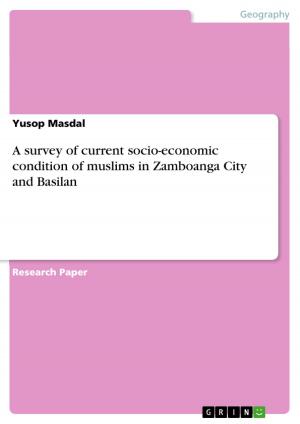Do international trade relations between the third world and the first world represent neo-colonial tendencies
Nonfiction, Social & Cultural Studies, Political Science| Author: | Sebastian Weber | ISBN: | 9783638409414 |
| Publisher: | GRIN Publishing | Publication: | August 16, 2005 |
| Imprint: | GRIN Publishing | Language: | English |
| Author: | Sebastian Weber |
| ISBN: | 9783638409414 |
| Publisher: | GRIN Publishing |
| Publication: | August 16, 2005 |
| Imprint: | GRIN Publishing |
| Language: | English |
Essay from the year 2003 in the subject Politics - International Politics - Topic: Globalization, Political Economics, grade: 2, University of Cape Town, course: Third World Politics, 19 entries in the bibliography, language: English, abstract: With the decolonisation starting after World War II African countries became independent from their former European colonisers. While the process of achieving political independence is generally accepted as completed, economic independence remains uncertain. There are various fields in which dependency on former colonisers can be observed. Many African politicians and Non Governmental Organisations (NGOs) regard supra-international institutions like the World Bank, the International Monetary Fund (IMF) and the World Trade Organisation (WTO) as western dominated institutions, which impose their ideas of Politics and Economics on the so called 'third world countries'. This can take place in forms of credits to African countries by the IMF. These credits are subject to 'Structural Adjustment Programs' (SAPs) the receiving country has to implement. A SAP mainly focuses on the liberalisation of a country's economy and thereby takes the country's independence in choosing its own policies. In the last twenty years NGOs, academics and politicians became aware of an emergent debate on a new world order in trade relations. By criticising the trade policy of developed countries, NGOs, such as Oxfam and Attac, accuse these countries of keeping the third world poor and dependent on the first world (Oxfam 2002). By subsidising the own economy and protecting it through tariffs, developed countries hinder the developing countries to increase exports and thereby national income. This essay focuses on this relationship between the third and the first world in international trade. It aims to prove the statement of the NGOs and thereby figure out whether there is a neo-colonial tendency in trade relations between the first and the third world) or not.
Essay from the year 2003 in the subject Politics - International Politics - Topic: Globalization, Political Economics, grade: 2, University of Cape Town, course: Third World Politics, 19 entries in the bibliography, language: English, abstract: With the decolonisation starting after World War II African countries became independent from their former European colonisers. While the process of achieving political independence is generally accepted as completed, economic independence remains uncertain. There are various fields in which dependency on former colonisers can be observed. Many African politicians and Non Governmental Organisations (NGOs) regard supra-international institutions like the World Bank, the International Monetary Fund (IMF) and the World Trade Organisation (WTO) as western dominated institutions, which impose their ideas of Politics and Economics on the so called 'third world countries'. This can take place in forms of credits to African countries by the IMF. These credits are subject to 'Structural Adjustment Programs' (SAPs) the receiving country has to implement. A SAP mainly focuses on the liberalisation of a country's economy and thereby takes the country's independence in choosing its own policies. In the last twenty years NGOs, academics and politicians became aware of an emergent debate on a new world order in trade relations. By criticising the trade policy of developed countries, NGOs, such as Oxfam and Attac, accuse these countries of keeping the third world poor and dependent on the first world (Oxfam 2002). By subsidising the own economy and protecting it through tariffs, developed countries hinder the developing countries to increase exports and thereby national income. This essay focuses on this relationship between the third and the first world in international trade. It aims to prove the statement of the NGOs and thereby figure out whether there is a neo-colonial tendency in trade relations between the first and the third world) or not.















